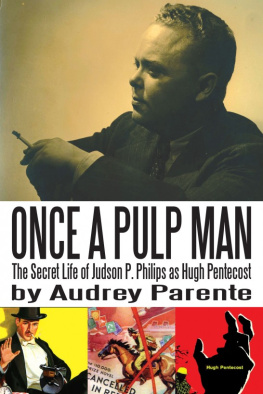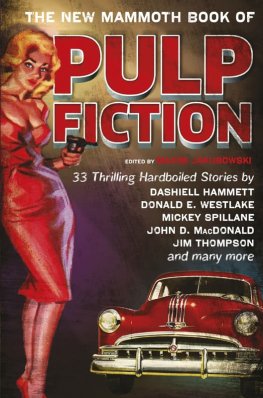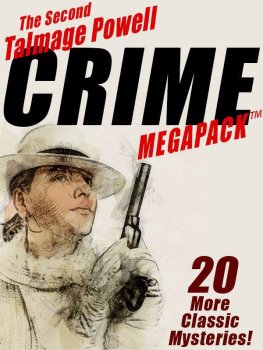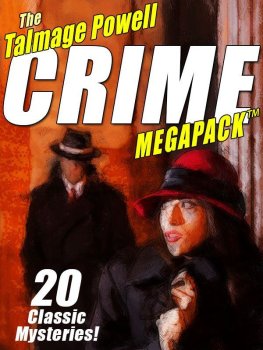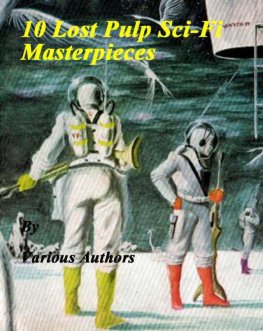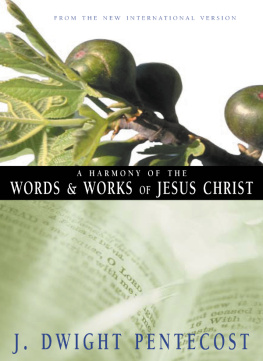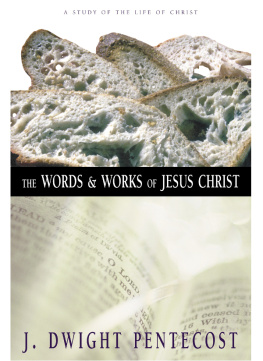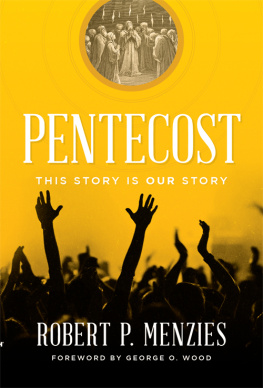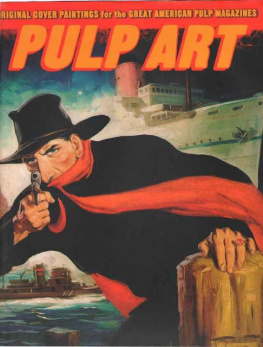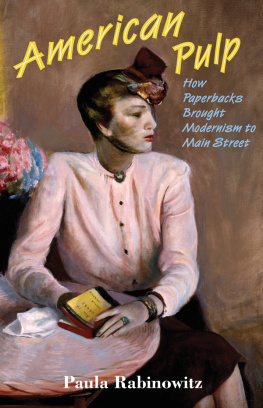Once a Pulp Man
The Secret Life of Judson P. Philips as HughPentecost
Audrey Parente
Published by Bold Venture Press
www.boldventurepress.com
Cover design: Rich Harvey
Once a Pulp Man:
The Secret Life of Judson P. Philips as Hugh Pentecost
by Audrey Parente
Copyright 2016 by Audrey Parente. All RightsReserved.
This book is available in print at most onlineretailers.
All rights reserved. No part of this book may bereproduced or transmitted in any form or by any means withoutexpress permission of the publisher and copyright holder. Allpersons, places and events in this book are fictitious. Anyresemblance to any actual persons, places or events is purelycoincidental.
License Notes
This ebook is licensed for your personal enjoymentonly. This ebook may not be re-sold or given away to other people.If you would like to share this book with another person, pleasepurchase an additional copy for each recipient. If youre readingthis book and did not purchase it, or it was not purchased for yourenjoyment only, please purchase your own copy.
Introduction
by Bernard A. Drew
It takes hard work, practice, diligence andpersistence to become a successful fiction writer and naturaltalent doesnt hurt. By several measures, Judson P. Philips was asuccessful fiction writer. How he pursued his career is fascinatingand illustrative of a particular period in American literaryhistory.
Its more difficult to become established asa successful mystery writer today than when Philips did, as thereare few break-in opportunities.
Theres no magazine market, Philips toldme in 1979. It has disappeared except for Ellery QueensMystery Magazine, Alfred Hitchcock and a couple ofothers. Long time ago, there were a lot of markets for mysteries,American magazine, Liberty, the old SaturdayEvening Post. Those markets dont exist anymore.
Many genre fiction writers honed their crafton short stories.
The best chance today seems to be with thenovel, the full-length story, he said.
Arthur Conan Doyle collected hisStrand stories about Sherlock Holmes for book publication.But moving up wasnt easy for everyone. Literary periodicals acentury and a quarter ago may have had high images of themselves,but only a few nurtured enduring authors. At the other end of thespectrum, Mildred Wirt Benson, who wrote the first Nancy Drewmysteries as Carolyn Keene, was locked to a juvenile readership.Dime novelists had little opportunity to move into more enduringformats Old Sleuth or A New York Detective didnt even havenames to establish identities with their readers.
With the pre-World War I advent of the pulpmagazine format named for the newsprint on which they were printed Frank A. Munsey, Street & Smith, Popular Publications andother publishers recognized that readers would come back for moreif the publications gave editorial attention to promisingwriters.
There were dozens and dozens of pulp titlespublished between the wars, some weekly, some monthly or quarterly.Some lasted more than 100 issues (The Shadow, Doc Savage, TheSpider), some floundered after one or two (ZeppelinStories). Some struck particularly high notes (BlackMask, Weird Tales), others are best forgotten (SpicyMystery Stories). They paid a penny or two a word, more for thebetter-established writers.
Judson P. Philips, you will learn as youread Audrey Parentes Once A Pulpman, found regular marketswith Argosy, Detective Fiction Weekly, Detectivestory Magazine and other mystery pulps.
His rule of thumb was simple: Where theressuccess, be imitative. Latch onto something thats done real welland copy it. This has always been true. Its easy to find anexample; Philips Park Avenue Hunt Club series owed its roots toEdgar Wallaces three-decades-earlier Four Just Men.
Writers climbed the ladder from the pulps:Rex Stout, Raymond Chandler, Cornell Woolrich, Robert E. Howard(barely), Louis LAmour, A.E. Van Vogt, Theodore Sturgeon. They allthrived as book writers. Some sprang into the dazzling world ofscripting Hollywood films, Frank Gruber and Richard Sale amongthem. The next generation found homes with book publishers afterstarting out with the 1950s digest magazines shrunken pulps,really. Ed McBain. Lawrence Block. Donald. E. Westlake. BillPronzini.
Philips showed himself particularly adept atworking interesting settings or trades into his prose, quickly roseup the literary food chain to mass circulation magazines. He hadmodest name recognition. Fellow pulp writer Lester Dent, on theother hand, wrote scads of Doc Savage adventures under theStreet & Smith house alias Kenneth Robeson. But the name Dentmeant nothing to readers. When Philips needed a second byline,Hugh Pentecost, to carry some of the load, he had noobstacle.
Walter B. Gibson, alias Maxwell Grant,chronicler of The Shadow pulps, had the same problem asDent, but found ample work ghost writing magician autobiographies.Bill Severn, who excelled at cowboy romances, later producedjuvenile non-fiction and books about magic tricks. Herman Petersengraduated from Black Mask to hardcover mysteries. Anthony M.Rud took his Jigger Masters detective of the bizarre from the pulpsto hardcovers. I mention these authors in particular because I wasable to interview them or family members for introductory materialfor a six-issue run of a modest fanzine I called AtticRevivals (1979-1983). Severn lived in the same town I do, GreatBarrington, Mass., and is the only male romance writer Ive everinterviewed. Gibson was a little more than an hour away nearPoughkeepsie, N.Y., and loved to tell stories. Ruds son was aone-time co-worker and friend. Petersens son, who lived in hopscountry in New York state, still had his fathers story submissionfile.
Jud Philips lived just over the border inCanaan Valley, part of North Canaan, Conn., and was greatly bemusedby my interest in the old days. I featured his 1934 Park AvenueHunt Club story The Hawk in the first issue of my publication. Iincluded one of his Ivy Trask stories with a rare woman leadcharacter in a hardcover anthology for St. Martins Press,Hard-Boiled Dames (1986). Years later, he had a chapter in aliterary history of the Berkshires I wrote in 2015.
A more subliminal connection with Philipscame when I joined the staff of The Lakeville Journal in1996. Im an associate editor and front-page designer for the sameweekly to which Philips for years contributed a column. I didntexpect Id end up working regularly for the newspaper when as afreelancer in December 1979 I helped Philips introduce his latestbook, and newest alias. He wrote Mystery at a Country Inn oncommission from Norman T. Simpson of Berkshire Traveller Press inStockbridge, Mass. His regular publishers would have frowned ifhed used either of his regular bylines. So he became PhilipOwen. He did his research at the White Hart in Lakeville.
I enjoyed a couple of meals there and atthe Red Lion Inn in Stockbridge, he confided. If I do theresearch, if I know what Im writing about, people will recognizethe effort. Theyll feel closer to the work.
I work in the same village (Lakeville) inwhich Philips series character (under the Pentecost byline) UncleGeorge Crowder practiced law (Lakeview). One of the books (Deathby Fire) was based on the very real arson fire that destroyedthe town hall
in Salisbury, Conn. These days I sometimes drive to work along thesame stretch of road the writer appropriated for his eerilyprescient short story (and later novel) The Day the ChildrenVanished.
You dont have to be inPhilips/Pentecost/Owen territory to enjoy the writers books. Infact, I have a fondness for Death Delivers a Postcard(1939), in which Carole Trevor plays an unexpected private eye,having been given Old Town Detective Agency as part of a divorcesettlement by her ex, Broadway playboy Maxwell Blythe. The actionis on Long Island. Its Philips doing what Philips does well,taking a sure thing a spin on Dashiell Hammetts Nick and NoraCharles and giving it his own twist. Barely had I finishedreading the book, I searched out its predecessor,

